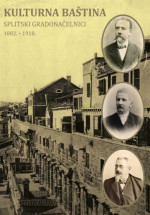Vinko Milić: načelnik Splita i „jedan iz prvih redova“
Vinko Milić: A Mayor on Frontline of Significant Changes
Author(s): Ivanka KuićSubject(s): Governance, Local History / Microhistory, Political history, 19th Century, Pre-WW I & WW I (1900 -1919)
Published by: DRUŠTVO PRIJATELJA KULTURNE BAŠTINE - SPLIT
Keywords: Vinko Milić (1833 – 1910); Split in 19th-20th century; Croatian Party in Dalmatia; Rijeka Resolution; Dalmatia 19th-20th century;
Summary/Abstract: This paper addresses the life and work of Vinko Milić, who, in the period 1899 — 1905, was the mayor of Split. In addition, this prominent intellectual was actively involved in the social and political life of the city, in a rather turbulent period of its history — the second half of the nineteenth and the early twenty centuries. Vinko Milić finished grammar school in Split and graduated law from universities in Padua and Graz. He started his law practice in Rijeka, but was reassigned to Varaždin on account of harsh criticism that he expressed against the authorities in one of his articles, Then, he worked as a court clerk around Dalmatia. His legal career ended in Dubrovnik, in 1895, where he served as president of the district court. After retirement, he was appointed as a representative in the Diet of Dalmatia. Vinko Milić caught the public eye in 1861 when he published the article under the title A Niccolo Tommaseo idalmatoslavi, ossia i questi dipatrio interesse. In the article, he expressed his views on the two significant issues at the time: the unification of Dalmatia and the Kingdom of Croatia and the autonomy of Dalmatia, Those two separate political models of development were reflective of the more complex socio-political tendencies, such as the Croatian national identity, preservation of national heritage and the use of Croatian language in schools and public institutions. Milić published a large number of articles in which he fervently advocated a rightful unification of Dalmatia and the Kingdom of Croatia, the right to free speech and the right to the free expression of one’s national identity reflected through a specific language and culture. In addition, he was one of the most significant associates of Ante Trumbić in the process of creation of the the so-called Rijeka Resolution. Milić published several articles on the resolution in both the weekly Narodni list and the brochure Postanak Riječke rezolucije i njezine posljedice (1907). As a mayor of Split, he initiated a number of projects that were significant for the growing city in the early 20th century. He worked on the improvement of public utility services, health, urban and cultural standards. During his tenure, the construction of the Croatian Lodge and the restoration of Diocletian’s Palace were initiated and the public library, that was founded in 1903, was granted permanent funding. Milić was a true intellectual who left an important mark in different spheres: he wrote a treatises on linguistic and literary issues and Ivan Gundulić; he published a paper about the Croatian lords from Bosnia and Herzegovina — the Babićs. In 1901, he published two poems in Latin by Marko Marulić and Frane Božićević Natalis. In addition, he founded the association Za Split — Per Spalato, which was the last of his social activities. The association was granted license by the Dalmatian Governorship in February, 1910, when Vinko Milić was already critically ill.
Journal: KULTURNA BAŠTINA : ČASOPIS ZA PITANJA PROŠLOSTI SPLITSKOGA PODRUČJA
- Issue Year: 2018
- Issue No: 44
- Page Range: 131-164
- Page Count: 34
- Language: Croatian

